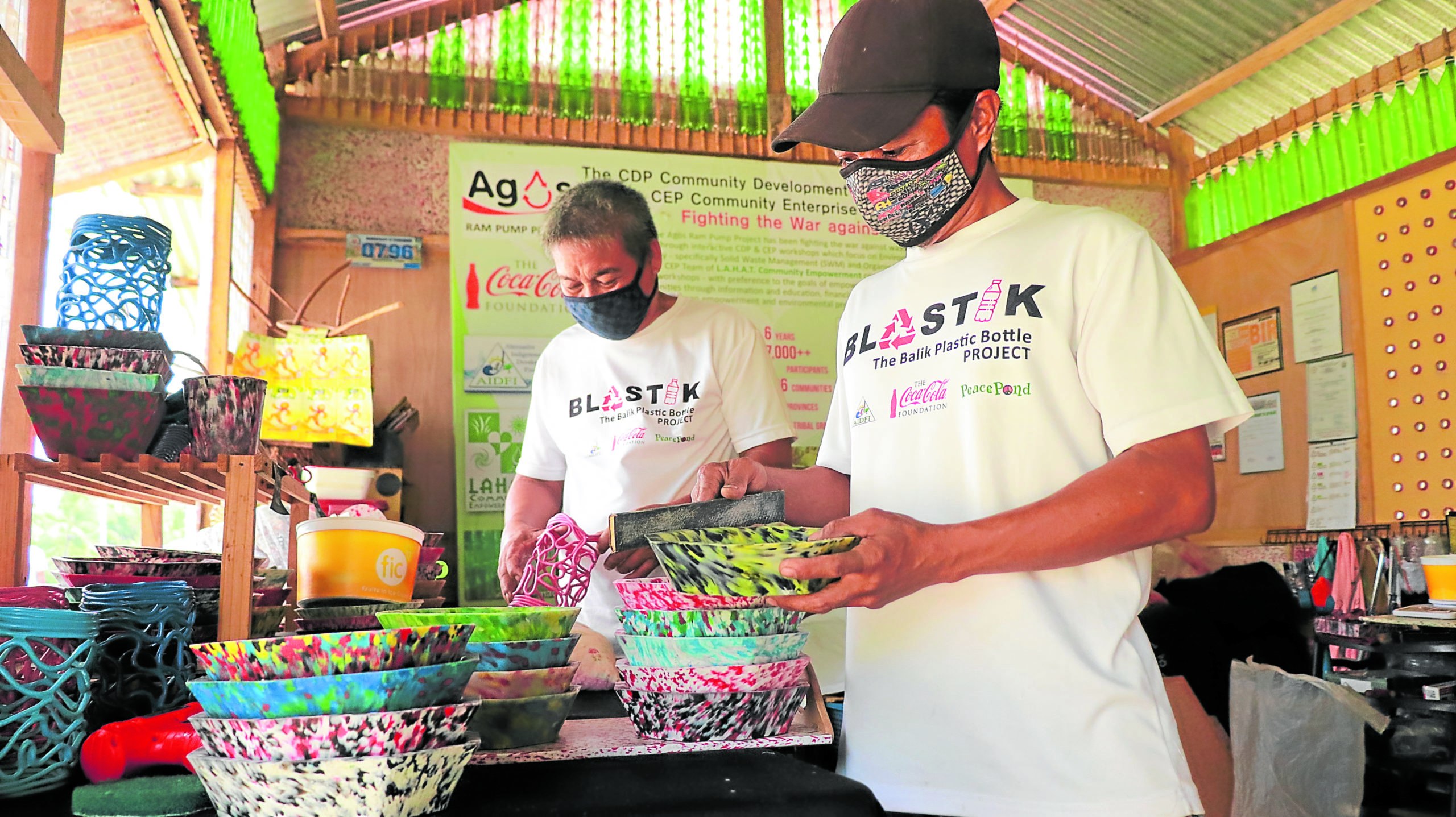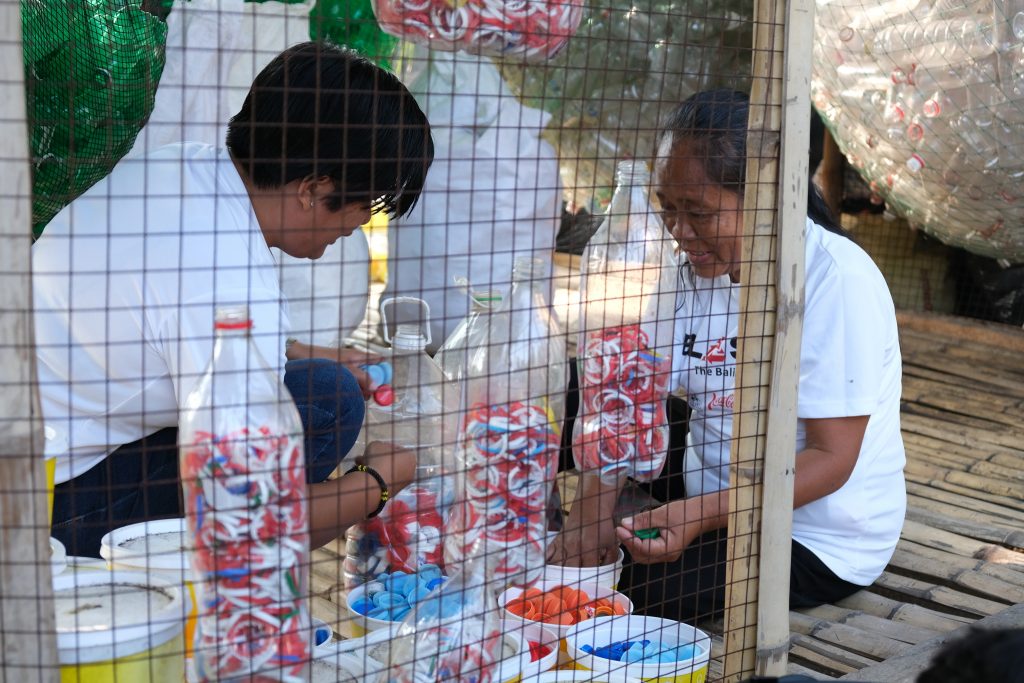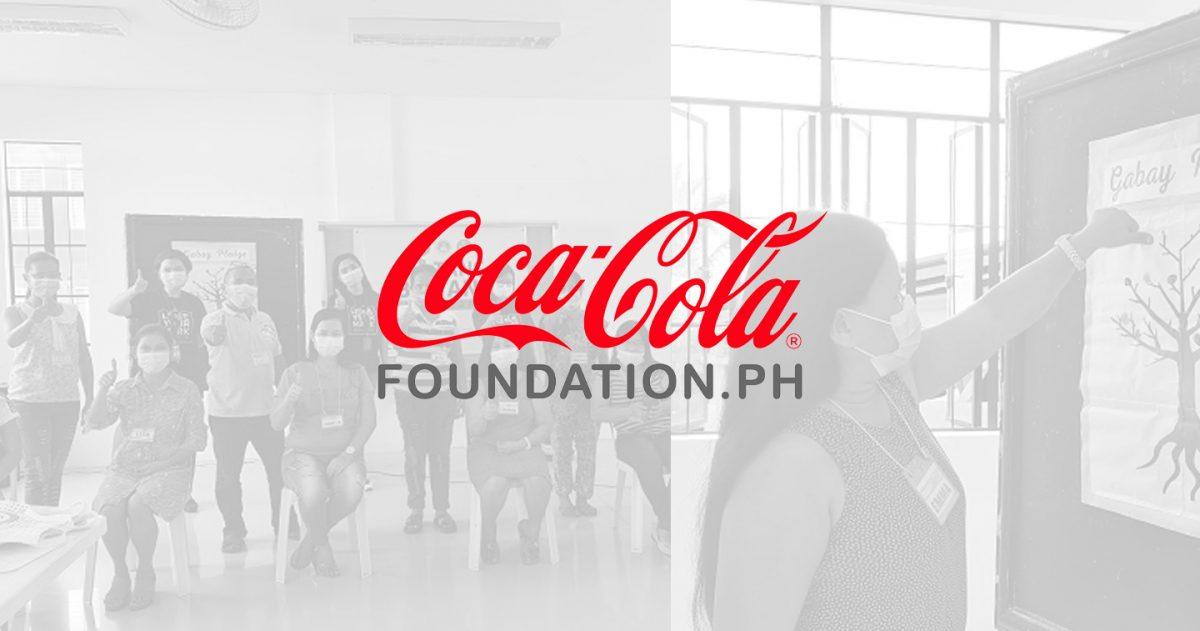According to report by National Waste Management Commission in 2018, the plastic recycling rate of the Philippines is only at 28%. 9,000 tons of 2.7 millions tons of annual waste end up in landfills or in bodies of water due to the insufficient number of recycling facilities, as well as improper waste disposal.
The use of disposables and reliance on e-commerce became more rampant when the COVID-19 pandemic struck. To address an avoidable waste crisis, better methods of collection and efficient recycling of plastics have become more critical.
Aligned with its World Without Waste Vision, Coca-Cola Philippines prioritizes the reduction of plastics being dumped in landfills and rivers as it aims to collect and recycle the equivalent number of bottles sold by 2030.
Philippines-based NGO Alternative Indigenous Development Foundation, Inc. (AIDFI) launched Blastik Project in 2019. The project piloted a village-scale plastic recycling center funded by The Coca-Cola Foundation, the international CSR department of The Coca-Cola Company, with the aim of increasing environmental awareness, providing livelihoods and financial assistance, and recycling more plastic.

After the project’s successful debut, Coca-Cola Philippines — through Coca-Cola Foundation Philippines — took over the financing of the partnership with a grant that runs from 2020 until 2023 with PeacePond — an organization that advocates solid waste management, organic and natural farming, education, culture and the arts, livelihood opportunities, and women and child empowerment in taking the lead in sustaining and expanding the project. The continuation of the Blastik Project hopes to share this value to more people both in cities and in the countryside.
The main proponent in communities of the Blastik Project is the PeacePond Farmers Association (PFA) in Binalbagan, Negros Occidental. These farmers’, or as they call themselves, the Blastik Eco Rangers, main responsibility is to educate and empower the community about proper waste segregation, recycling, and livelihoods through community workshops/webinars and ensure the proper implementation of the project.
Among the many beneficiaries of the project are Jo Guanco, a 53-year-old solid waste management advocate and secretary of the PeacePond Farmers Association, and 54-year-old PeacePond farmer, Junjun Gantes.
Jo and Junjun have been part of the Blastik Project since 2019. The initiative helped them understand the value of collecting and recycling used and clean plastic bottles. As Blastik Eco Rangers, they look at these used recyclable plastic bottles not as trash but as materials that can be used over and over again. Recyclable plastic bottles, as they have seen in the past years working on the Blastik Project, are seen as a versatile, lightweight material and, therefore, can be collected, recycled and used repeatedly. With this new way of looking at used collected plastic bottles as a valuable resource material, Blastik Project was able to open more livelihood opportunities for the people in their community — ultimately, giving them another source of income and way of putting food on their tables.
“Sa Blastik Project po, itinuturo namin ang importansya ng segregation at recycling sa aming mga kapitbahay at kalapit na mga barangay. Kami po ang naka-assign na mangolekta at makipag-coordinate sa mga barangay para sa schedule ng pagkolekta at kung minsan ang mga offices na ng barangay ang kumukontak sa amin para kunin ang plastic bottles dahil alam na po nila ang tungkol sa Blastik Project,” shares Blastik Eco Ranger Jo Guanco.
Through the Blastik Project, plastic bottles and caps are collected and creatively reused into wall tiles, desks, chairs, kitchen cabinets, bowls, plant pots, home décor, and more. Some PET bottles, mixed with sachets and plastic bags, are turned into pavers for footwalks and garden footpaths. Other PET bottles were transformed into free-standing walls for six structures in PeacePond while some are used for bottle gardens in the organic farm. Plastic labels are turned into handcrafted wallets, purses, bags, gadget pouches, laptop sleeves and even face mask cases.

“Malaking tulong rin po ang Blastik Project (at Coca-Cola) sa aking pamilya, lalo sa pang araw-araw naming pamumuhay. Dahil dun sa organic garden, nakakakuha kami ng gulay na maaaring ipakain sa aming mga pamilya at binabahagi rin namin ito sa aming mga kapitbahay at kapwa Eco Rangers,” shares Blastik Eco Ranger and PeacePond farmer Junjun Gantes.
The effectiveness and easy to replicate nature of the Blastik Project was able to speed up the expansion. The initiative is being benchmarked by other communities such as 600 beneficiaries from Bakyas Community in Oringao, Kabankalan and Ellite Ads Corp. in Paranaque and Carmone. The Blastik Project also has existing partnerships with Seda Hotel in Bacolod City and Southland College in Kabankalan, Negros Occidental.
Amidst the challenges brought about by the pandemic, the Blastik Project has collected, processed and recycled approximately 15,422 kilos (or a little more than 17 tons) of mixed bottles, bottle caps, sachets, and plastic labels.
Coca-Cola is a company known for its innovation, whether in product development, brand building, or facilitating positive change in the community. As the world evolves and modernizes, opportunities for environmental protection and innovation also arise. With projects like the Blastik Project and over 40 more zero-waste communities supported by the Coca-Cola Foundation Philippines, communities are increasingly seeing the value of plastic waste segregation and recycling.
“We are happy and excited about the Blastik Project’s initial success,” shares Cecile Alcantara, president of Coca-Cola Foundation Philippines. “The Coca-Cola Foundation Philippines will continue to partner with like-minded organizations and communities, supporting initiatives towards a world without waste.”
With additional report: BusinessWorld
Image sources: business.inquirer.net, Manila Bulletin, adobomagazine.com






